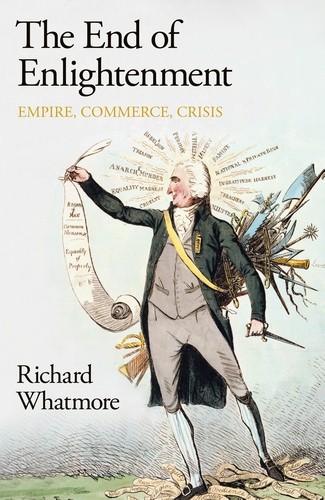Book Review: 'The End of Enlightenment' – Exploring the Complexities and Decline of an Intellectual Movement

Through this comprehensive analysis, 'The End of Enlightenment' provides a fresh perspective on this pivotal period in intellectual history. It encourages readers to reconsider their understanding of the Enlightenment as a continuous and unbroken tradition, inviting them to explore the complexities and fractures within this influential intellectual movement.(Photo : Penguin Random House)
'The End of Enlightenment: Unmaking of an Intellectual Movement' by Richard Whatmore delves into the intellectual and political landscape of the late 18th century, challenging the conventional narrative of the progress of the Enlightenment. Whatmore argues that the Enlightenment did not experience a steady rise but faced a decline and eventual demise.
In this book, Richard Whatmore vividly depicts the declining hope of 18th-century intellectuals as they faced the disillusionment of Enlightenment ideals. It scrutinizes how the French Revolution, often seen as a culmination of Enlightenment principles, also marked a turning point that led to the movement's decline.
A prominent figure mentioned in this book is the political propagandist Thomas Paine. Paine believed that Britain needed to undergo a radical transformation. He argued that its monarchy should be overthrown, the empire dismantled, and the mercantile system supporting the debt-ridden state abolished. He envisioned a better version of Britain emerging from this disruption. However, his ideas were not actualized.
READ ALSO: Academic Bibliophobia: Balancing Academic Reading and Reading for Pleasure
In a 1970s National Convention in Paris, Paine suggested to the Republicans to invade Britain and turn it into a Republic. While Paine's nemesis, conservative thinker Edmund Burke, considered him a traitor, intellectuals like Mary Wollstonecraft, Catharine Macaulay, Edward Gibbon, and David Hume expressed the same sentiment about the state of Britain under the mentally troubled King George III and his corrupt advisors. This period saw various intellectuals grappling with concerns about the direction in which Britain was heading.
These intellectuals referred to Adam Smith's 1776 work, 'The Wealth of Nations,' in understanding what had gone wrong. In this influential piece, the renowned Scottish economist criticized a corrupt alliance of bankers, politicians, and merchants for prioritizing personal profit over the welfare of society.
Parallel to Smith's sentiments, Whatmore's narrative gains particular intrigue in showcasing how Britain presented itself as a free state where citizens supposedly enjoyed more rights and liberties than their European counterparts. According to Whatmore, Smith's associate David Hume perceived an enlightened Britain with a moderate and peaceful public culture. As he envisioned it, this enlightenment banished religious fanaticism from public life.
Contemporary interpretations of the Enlightenment vary, contrasting Whatmore's optimistic view. John Gray associates the Enlightenment with the pitfalls of global capitalism, Foucault associated the Enlightenment with the ascent of the surveillance state, and Adorno and Horkheimer contended that its focus on reason contributed to the horrors of Auschwitz. Kant and Spinoza see it as humanity's triumphant journey from irrationality to wisdom.
Whatmore, along with the thinkers he profiles, rejects these interpretations. The Enlightenment had a clear goal for them: to eliminate the superstition that had soaked 17th-century Europe in blood. It concluded with Britain's imperial endeavors, its attempt to dominate much of the world for its gain, and the revolutionary terror in Paris after 1792.
Whatmore points out the similarities between 18th-century Britain and its contemporary counterpart, emphasizing the presence of class disparities, inequality, and an emphasis on individual profit. The book acts as a warning, underscoring the risks of deviating from the principles of reason and enlightenment.
RELATED ARTICLE: 'A Republic of Scoundrels:' Newly Published Book Unveils America's Founding Fathers' Schemes and Exploits
© 2023 Books & Review All rights reserved.
Popular Now
1
Books to Read After 'Fourth Wing': Top Picks for Fantasy and Romantasy Fans

2
‘The Secret Public’ by Jon Savage Book Review: An Insightful Look Into the LGBTQ Influence

3
Stephanie Regalado's 'If They Only Knew' Column Is Now A Book, Unleashing 60 Anonymous True Stories to Empower Women

4
'No Wire Hangers' Scene That Almost Did Not Happen: New Book Reveals Faye Dunaway's Struggles

5
Rare First Edition of Aphra Behn's Novel 'Oroonoko' Discovered in Kent: A Historic Literary Find

Latest Stories
Book Reviews
‘The Secret Public’ by Jon Savage Book Review: An Insightful Look Into the LGBTQ Influence

Book News
Stephanie Regalado's 'If They Only Knew' Column Is Now A Book, Unleashing 60 Anonymous True Stories to Empower Women

Book News
'No Wire Hangers' Scene That Almost Did Not Happen: New Book Reveals Faye Dunaway's Struggles

Book Reviews
‘The Perfect Couple’ by Elin Hilderbrand Book Review: A Captivating Summer Mystery

Book News
New Book ‘The Franchise’ Reveals Penguins President Kyle Dubas’ ‘Biggest Mistake’ as Maple Leafs GM











